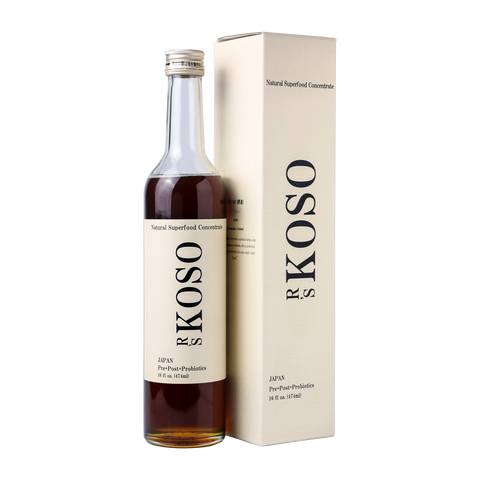How Seasonal Allergies Are Linked to Gut Health
As spring arrives, many people look forward to warmer temperatures and blooming flowers. However, for those who suffer from seasonal allergies, this time of year can bring uncomfortable symptoms like sneezing, itchy eyes, and congestion. While allergy medications and protective gear like masks and glasses can help reduce symptoms, they do not address the root cause of allergies.
Recent research suggests that gut health plays a significant role in regulating immune responses, including allergic reactions. By improving gut health, it may be possible to reduce the severity of seasonal allergies naturally. Let’s explore the connection between allergies and gut health and how R’s KOSO can be a valuable ally in supporting your immune system.
The Gut-Immune System Connection
The gut is home to nearly 70% of the body’s immune cells. A well-balanced gut microbiome helps regulate immune responses, preventing excessive reactions to harmless substances like pollen. However, when the gut microbiome is imbalanced—often due to poor diet, stress, antibiotics, or environmental toxins—it can lead to an overactive immune system, increasing the likelihood of allergic reactions.
Two key types of gut bacteria are particularly important for allergy management:
1. Lactobacillus acidophilus L-92 – Studies have shown that consuming foods containing this probiotic strain for two weeks can reduce sneezing and eye irritation in allergy sufferers.
2. Butyrate-producing bacteria – These bacteria produce butyrate, a short-chain fatty acid that helps regulate immune responses. Research indicates that people with allergies tend to have lower levels of butyrate-producing bacteria, which may contribute to heightened allergic reactions.
Supporting Gut Health to Manage Allergies
Improving gut health can help balance immune function and reduce allergy symptoms. Here are three practical steps to support your gut and combat seasonal allergies:
1. Increase Your Intake of Probiotic and Prebiotic Foods
Probiotics introduce beneficial bacteria to the gut, while prebiotics serve as food for these bacteria, helping them thrive. Fermented foods such as miso, kimchi, yogurt, and R’s KOSO, a fermented postbiotic drink rich in beneficial bacteria, can support a healthier gut microbiome. Additionally, fiber-rich foods like onions, garlic, bananas, and oats provide nourishment for gut bacteria.
2. Reduce Gut-Disrupting Foods
Certain foods and substances can harm beneficial gut bacteria, leading to imbalances that may worsen allergies. These include:
-
Highly processed foods
-
Refined sugar
-
Artificial additives and preservatives
-
Excessive alcohol
While completely avoiding these may not always be practical, minimizing intake and choosing whole, natural foods whenever possible can benefit gut health.
3. Manage Stress and Prioritize Sleep
Chronic stress and sleep deprivation can weaken gut health and negatively impact immune function. Incorporating relaxation techniques like meditation, deep breathing, and light exercise can help maintain a balanced gut microbiome and reduce allergy symptoms over time.
How R’s KOSO Can Help with Allergy Management
R’s KOSO is a postbiotic drink made from over 100 plant-based ingredients fermented for more than one year in Japan, naturally rich in probiotics, prebiotics, postbiotics, and polyphenols. By incorporating R’s KOSO into your daily routine, it might help:
-
Support a diverse and healthy gut microbiome
-
Enhance butyrate-producing bacteria, helping to regulate immune responses
-
Reduce inflammation linked to seasonal allergies
-
Improve digestion and nutrient absorption, further strengthening immunity
For best results, take R’s KOSO daily as part of a well-balanced diet. Mix 15 ml (0.5 oz) of R’s KOSO Original with 1/4 cup of sparkling or filtered water and enjoy it 1 to 2 times per day, before breakfast and/or dinner. You can also add it to smoothies or use it as a healthy sweetener alternative in coffee and tea.
Conclusion
Seasonal allergies can be frustrating, but improving gut health offers a natural way to support immune balance and reduce symptoms. By incorporating probiotic-rich foods, minimizing gut-disrupting substances, and managing stress, you can create a stronger foundation for long-term allergy relief. Adding R’s KOSO to your routine provides an easy and effective way to nourish your gut and enhance your overall well-being.
Try incorporating gut-friendly habits today, and experience a smoother transition into allergy season.

